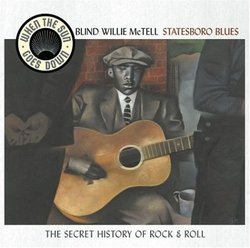| All Artists: Blind Willie Mctell Title: Statesboro Blues Members Wishing: 2 Total Copies: 0 Label: RCA Victor Europe Release Date: 9/9/2003 Album Type: Original recording reissued, Original recording remastered, Import Genres: Country, Blues, Pop Styles: Classic Country, Delta Blues, Traditional Blues, Regional Blues, East Coast Blues, Acoustic Blues Number of Discs: 1 SwapaCD Credits: 1 UPCs: 828765515726, 082876551572 |
Search - Blind Willie Mctell :: Statesboro Blues
 | Blind Willie Mctell Statesboro Blues Genres: Country, Blues, Pop
|
Larger Image |
CD Details |
CD Reviews****1/2 - a fine introduction to Mr McTell Docendo Discimus | Vita scholae | 12/28/2004 (5 out of 5 stars) ""Statesboro Blues" is the ninth item in the "Secret History Of Rock n' Roll" series, and it presents 17 classic performances by singer/guitarist Blind Willie McTell. These tracks were recorded between late 1927 through February 1932 for RCA Victor, and while there are other more comprehensive Willie McTell-compilations, this one is a very good starting place for anyone not familiar with the prewar blues master. McTell was a magnificent guitarist and a fine, expressive singer, and songs like "Writin' Paper Blues", "Stole Rider Blues", "Love Changing Blues", and the classic "Statesboro Blues" are not just among his best singles, they're simply some of the finest, most sophisticated prewar blues singles ever recorded. And the beautiful slide guitar-workout "Mama 't'Ain't Long Fo' Day" is perhaps the most inspired song of the lot, one of the most remarkable blues tunes you'll ever hear, played by a true master of his craft. This is an excellent appetizer. And no, there aren't two or three guitarists playing, just Blind Willie McTell." The Blues Goes to The City Alfred Johnson | boston, ma | 05/23/2008 (5 out of 5 stars) "Recently I have been doing a run of reviews on old time country blues players that have included the likes of Mississippi John Hurt and Son House. Here we are getting a little slice of what the acoustic blues looks like when it went to the Southern cities in the 1920's and 1930's. Hurt and House stayed on the farm, so to speak, but McTell, blind from birth I believe, went to the streets of the cities to sing his songs and make his daily bread. Along the way he worked with women singers and sometimes with the legendary Tommy Dorsey (no, not the bandleader from the forties). But mainly he worked the streets and joints alone.
A close listen immediately tells you that this artist is different from the country blues singers mentioned above. The guitar work is more polished (check it out on Statesboro Blues, if you want a treat) but the whole presentation is also different. The lyrics are more polished (and raucous) and the presentation is clearly geared to an audience that can walk out the door if it does not like what it hears. Hell, there are seven other guys or gals down the street to listen to. This is really the first manifestation, in song, of the changeover in the blues from the chant like quality of the pace of the cotton field to the rhythms of urban life. Some called it barrelhouse, and that would seem a right fit. It changes again latter when it goes north and gets electrified but here McTell and a little later Big Bill Broozey (and, as always, Robert Johnson) are pushing the work in new directions. Give it a listen. " |

 Track Listings (17) - Disc #1
Track Listings (17) - Disc #1